Abstract
Premature ovarian failure is a common condition of uncertain aetiology in most cases, although autoimmunity is thought to play a role in a proportion of cases. The frequency of ovarian antibodies, which may be markers for an autoimmune aetiology in this condition, remains unclear. To define this further, we have examined the sera of 45 women with premature ovarian failure (five with iatrogenic ovarian failure, nine with an associated autoimmune disease, and 27 with idiopathic ovarian failure), as well as four women with infertility due to Turner's syndrome and 41 pre- and post-menopausal controls. Using two human ovarian antigen preparations, 24% and 60% of the ovarian failure patients reacted in an ELISA (P < 0.05 and P < 0.001 compared with controls), but frequent cross-reactivity was found with fallopian tube antigens. The apparent aetiology of ovarian failure did not correlate with the presence of ovarian antibodies. Using bovine ovary as an antigen, there was a significant overall increase in binding by the ovarian failure patients, but this was almost identical to binding in an ELISA with bovine fallopian tube. In contrast to a previous report, there was no significant increase of binding to soluble or Triton-extracted membrane fractions of bovine corpora lutea containing the LH/hCG receptor by the patients with ovarian failure. These results suggest that ovarian antibodies are common in premature ovarian failure, but their specificity and pathogenic role are questionable.
Full text
PDF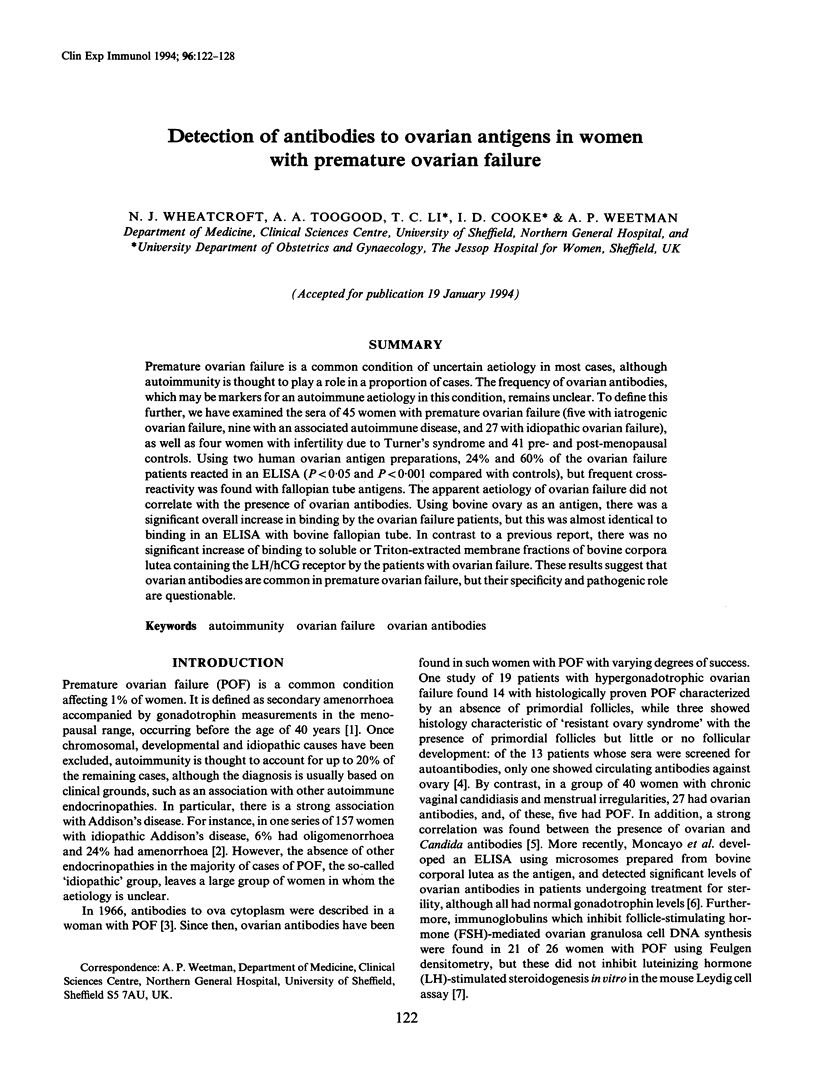
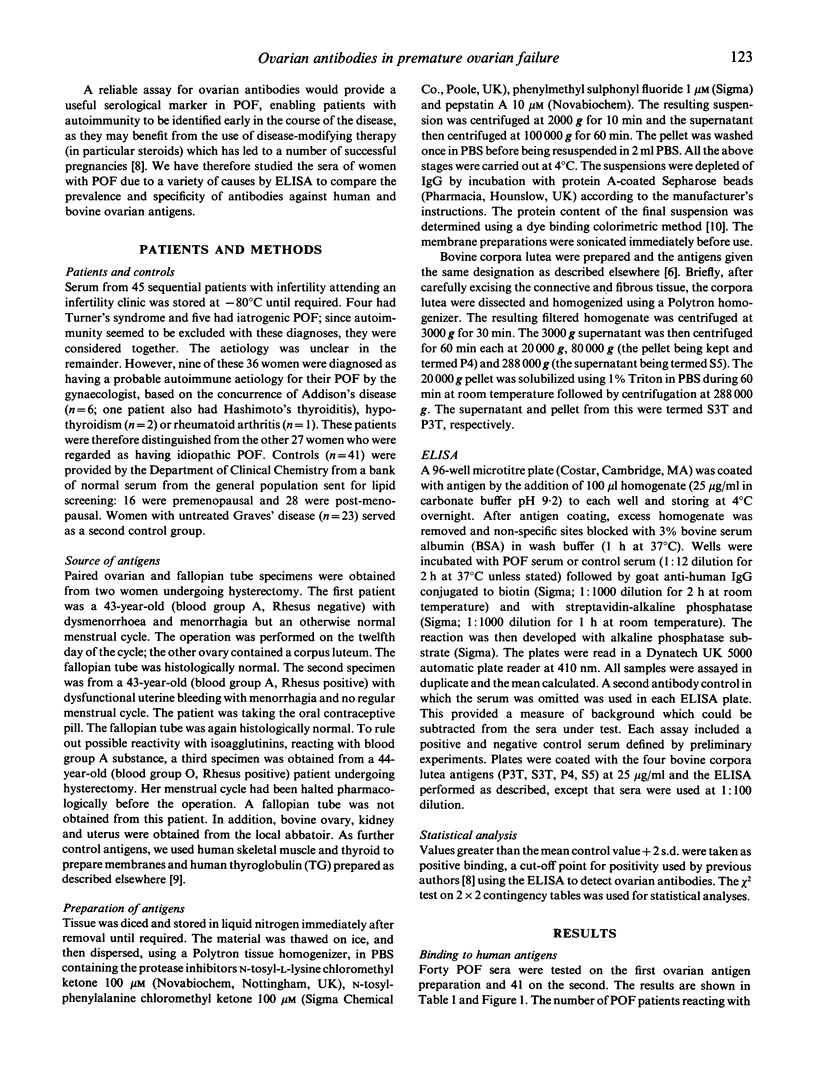
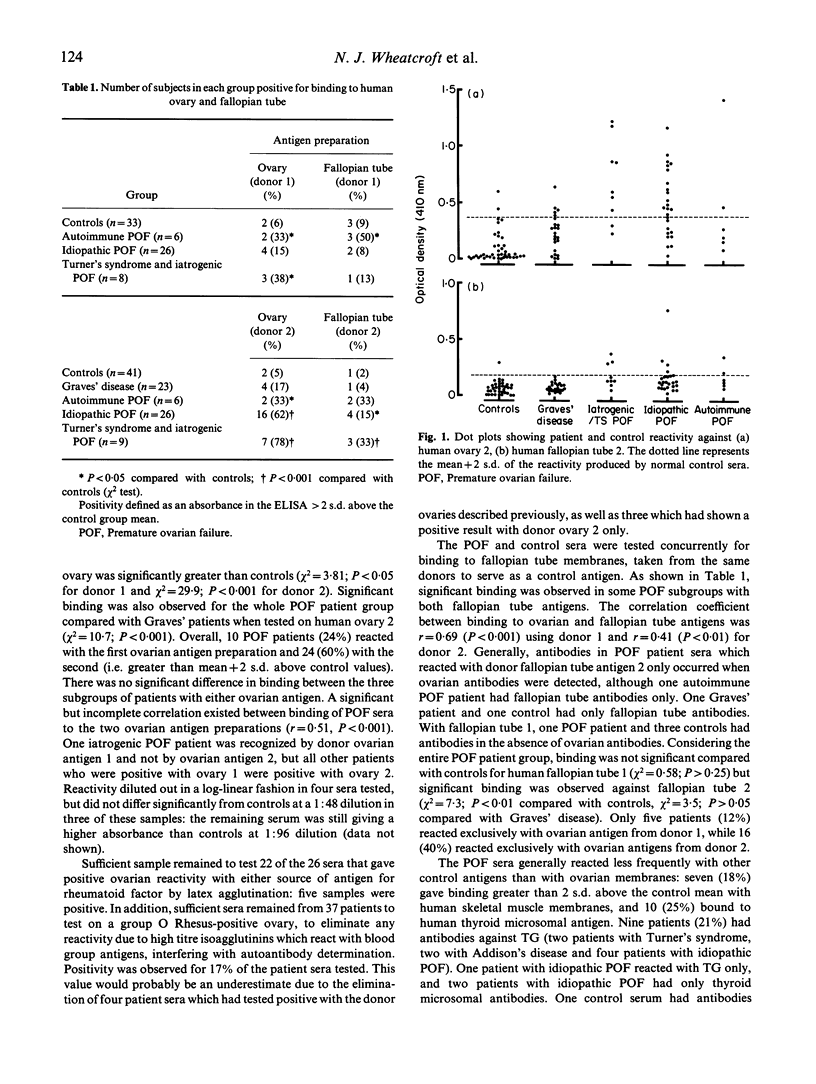
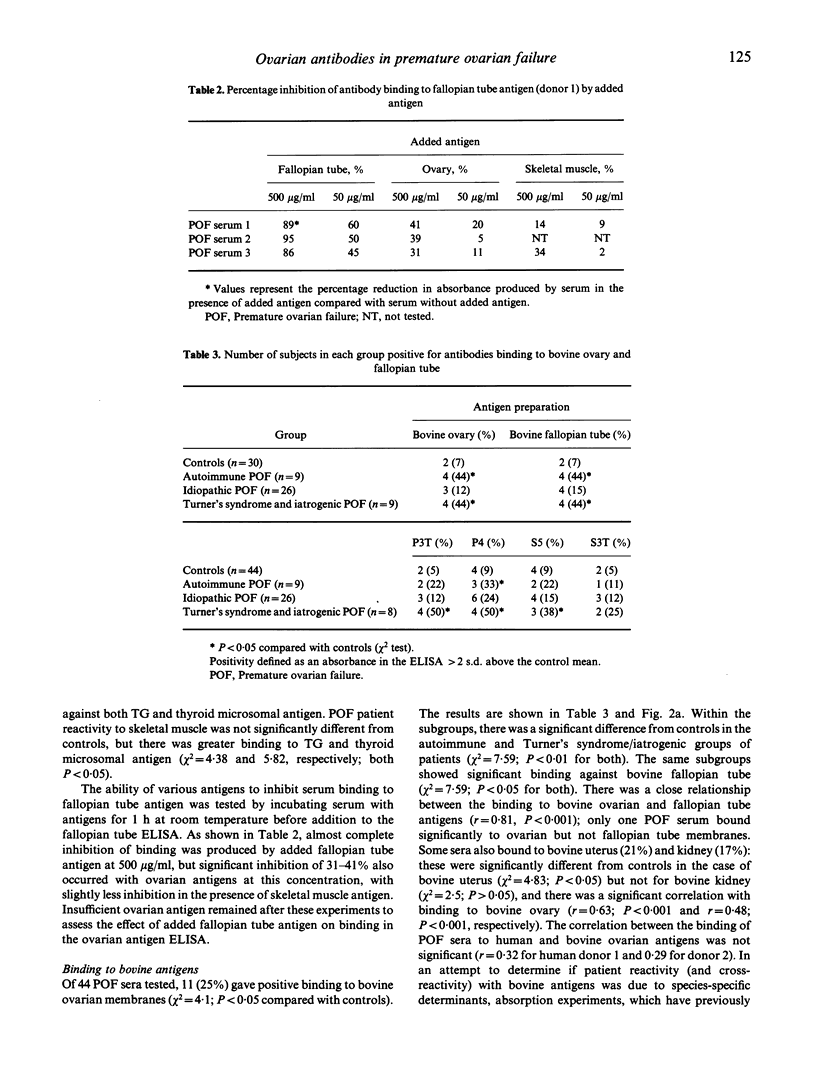
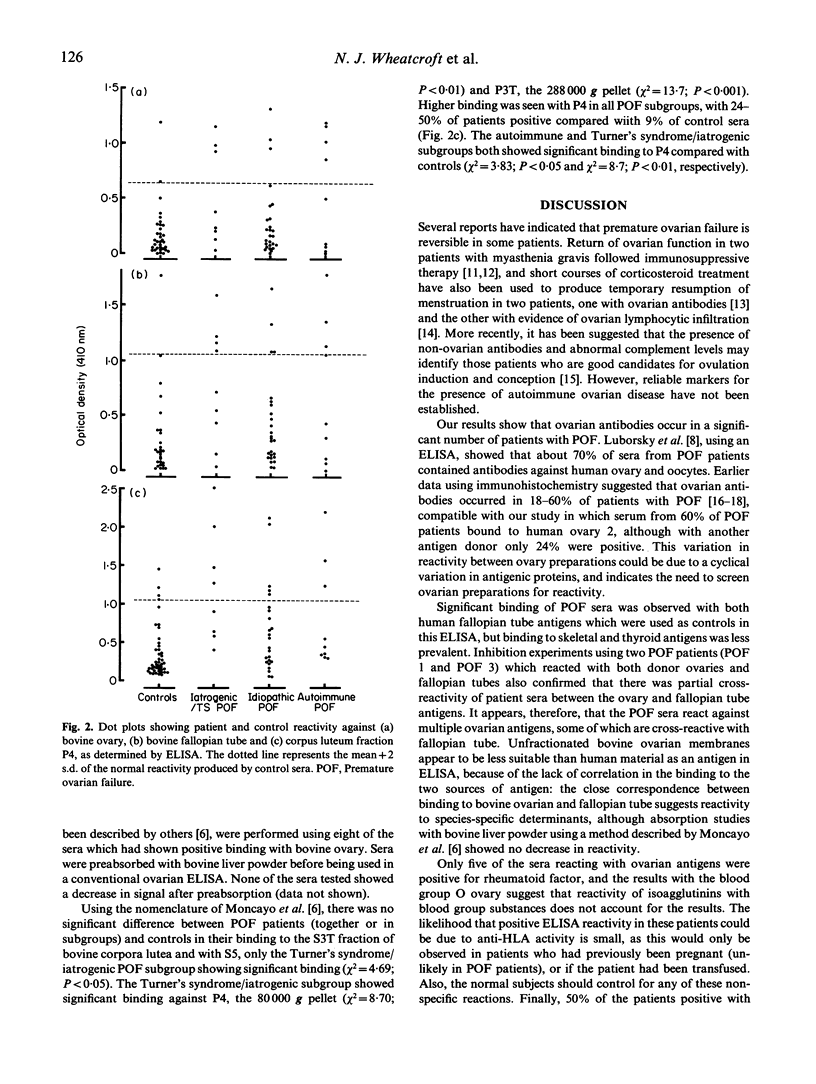
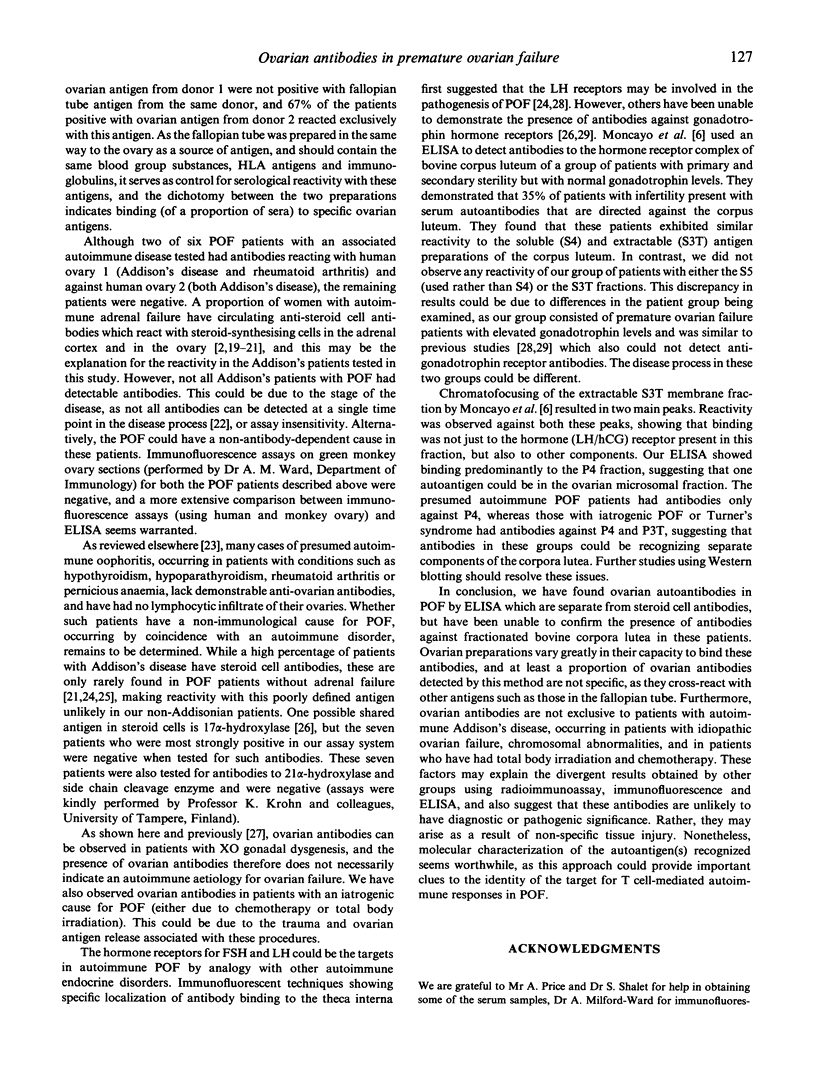
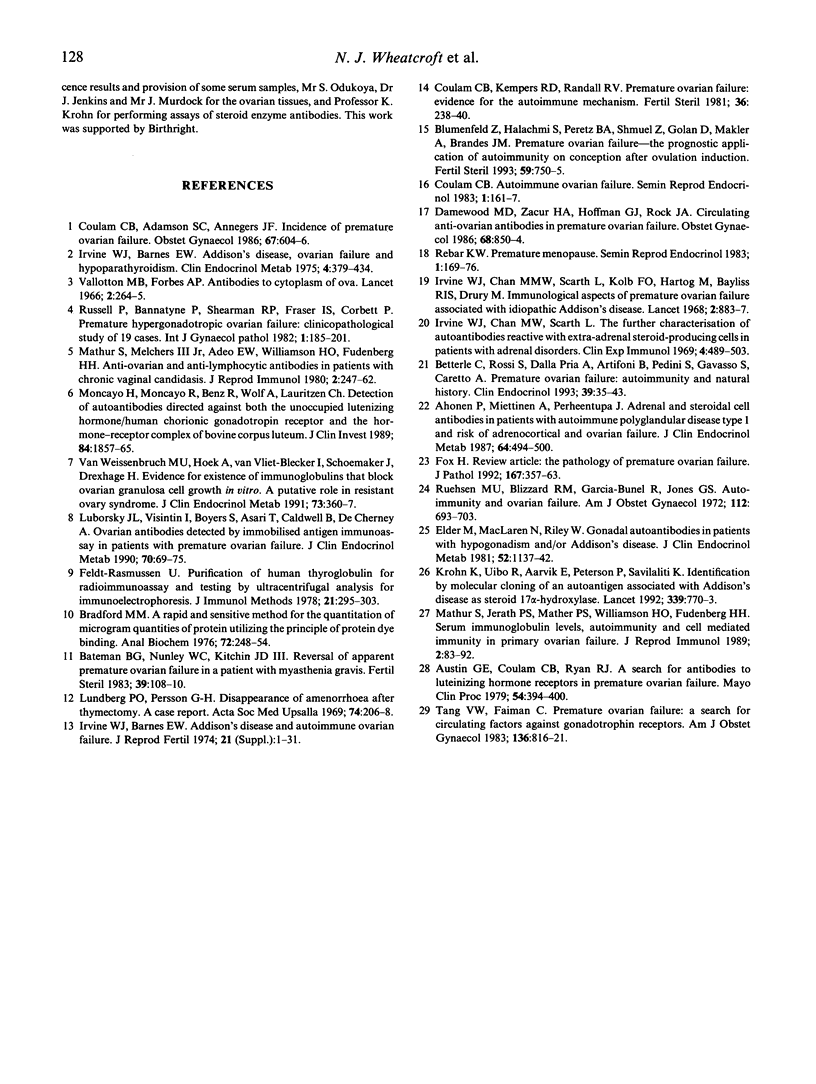
Selected References
These references are in PubMed. This may not be the complete list of references from this article.
- Ahonen P., Miettinen A., Perheentupa J. Adrenal and steroidal cell antibodies in patients with autoimmune polyglandular disease type I and risk of adrenocortical and ovarian failure. J Clin Endocrinol Metab. 1987 Mar;64(3):494–500. doi: 10.1210/jcem-64-3-494. [DOI] [PubMed] [Google Scholar]
- Austin G. E., Coulam C. B., Ryan R. J. A search for antibodies to luteinizing hormone receptors in premature ovarian failure. Mayo Clin Proc. 1979 Jun;54(6):394–400. [PubMed] [Google Scholar]
- Bateman B. G., Nunley W. C., Jr, Kitchin J. D., 3rd Reversal of apparent premature ovarian failure in a patient with myasthenia gravis. Fertil Steril. 1983 Jan;39(1):108–110. doi: 10.1016/s0015-0282(16)46768-3. [DOI] [PubMed] [Google Scholar]
- Betterle C., Rossi A., Dalla Pria S., Artifoni A., Pedini B., Gavasso S., Caretto A. Premature ovarian failure: autoimmunity and natural history. Clin Endocrinol (Oxf) 1993 Jul;39(1):35–43. doi: 10.1111/j.1365-2265.1993.tb01748.x. [DOI] [PubMed] [Google Scholar]
- Blumenfeld Z., Halachmi S., Peretz B. A., Shmuel Z., Golan D., Makler A., Brandes J. M. Premature ovarian failure--the prognostic application of autoimmunity on conception after ovulation induction. Fertil Steril. 1993 Apr;59(4):750–755. doi: 10.1016/s0015-0282(16)55854-3. [DOI] [PubMed] [Google Scholar]
- Bradford M. M. A rapid and sensitive method for the quantitation of microgram quantities of protein utilizing the principle of protein-dye binding. Anal Biochem. 1976 May 7;72:248–254. doi: 10.1006/abio.1976.9999. [DOI] [PubMed] [Google Scholar]
- Coulam C. B., Adamson S. C., Annegers J. F. Incidence of premature ovarian failure. Obstet Gynecol. 1986 Apr;67(4):604–606. [PubMed] [Google Scholar]
- Coulam C. B., Kempers R. D., Randall R. V. Premature ovarian failure: evidence for the autoimmune mechanism. Fertil Steril. 1981 Aug;36(2):238–240. doi: 10.1016/s0015-0282(16)45687-6. [DOI] [PubMed] [Google Scholar]
- Damewood M. D., Zacur H. A., Hoffman G. J., Rock J. A. Circulating antiovarian antibodies in premature ovarian failure. Obstet Gynecol. 1986 Dec;68(6):850–854. [PubMed] [Google Scholar]
- Elder M., Maclaren N., Riley W. Gonadal autoantibodies in patients with hypogonadism and/or Addison's disease. J Clin Endocrinol Metab. 1981 Jun;52(6):1137–1142. doi: 10.1210/jcem-52-6-1137. [DOI] [PubMed] [Google Scholar]
- Feldt-Rasmussen U. Purification of human thyroglobulin for radioimmunoassay and testing by ultracentrifugal analysis and immunoelectrophoresis. J Immunol Methods. 1978;21(3-4):295–303. doi: 10.1016/0022-1759(78)90156-4. [DOI] [PubMed] [Google Scholar]
- Fox H. The pathology of premature ovarian failure. J Pathol. 1992 Aug;167(4):357–363. doi: 10.1002/path.1711670402. [DOI] [PubMed] [Google Scholar]
- Irvine W. J., Chan M. M., Scarth L., Kolb F. O., Hartog M., Bayliss R. I., Drury M. I. Immunological aspects of premature ovarian failure associated with idiopathic Addison's disease. Lancet. 1968 Oct 26;2(7574):883–887. doi: 10.1016/s0140-6736(68)91053-2. [DOI] [PubMed] [Google Scholar]
- Irvine W. J., Chan M. M., Scarth L. The further characterization of autoantibodies reactive with extra-adrenal steroid-producing cells in patients with adrenal disorders. Clin Exp Immunol. 1969 May;4(5):489–503. [PMC free article] [PubMed] [Google Scholar]
- Krohn K., Uibo R., Aavik E., Peterson P., Savilahti K. Identification by molecular cloning of an autoantigen associated with Addison's disease as steroid 17 alpha-hydroxylase. Lancet. 1992 Mar 28;339(8796):770–773. doi: 10.1016/0140-6736(92)91894-e. [DOI] [PubMed] [Google Scholar]
- Luborsky J. L., Visintin I., Boyers S., Asari T., Caldwell B., DeCherney A. Ovarian antibodies detected by immobilized antigen immunoassay in patients with premature ovarian failure. J Clin Endocrinol Metab. 1990 Jan;70(1):69–75. doi: 10.1210/jcem-70-1-69. [DOI] [PubMed] [Google Scholar]
- Lundberg P. O., Persson B. H. Disappearance of amenorrhea after thymectomy. A case report. Acta Soc Med Ups. 1969;74(3-4):206–208. [PubMed] [Google Scholar]
- Mathur S., Melchers J. T., 3rd, Ades E. W., Williamson H. O., Fudenberg H. H. Anti-ovarian and anti-lymphocyte antibodies in patients with chronic vaginal candidiasis. J Reprod Immunol. 1980 Dec;2(5):247–262. doi: 10.1016/0165-0378(80)90038-8. [DOI] [PubMed] [Google Scholar]
- Moncayo H., Moncayo R., Benz R., Wolf A., Lauritzen C. Ovarian failure and autoimmunity. Detection of autoantibodies directed against both the unoccupied luteinizing hormone/human chorionic gonadotropin receptor and the hormone-receptor complex of bovine corpus luteum. J Clin Invest. 1989 Dec;84(6):1857–1865. doi: 10.1172/JCI114372. [DOI] [PMC free article] [PubMed] [Google Scholar]
- Russell P., Bannatyne P., Shearman R. P., Fraser I. S., Corbett P. Premature hypergonadotropic ovarian failure: clinicopathological study of 19 cases. Int J Gynecol Pathol. 1982;1(2):185–201. doi: 10.1097/00004347-198202000-00006. [DOI] [PubMed] [Google Scholar]
- Tang V. W., Faiman C. Premature ovarian failure: a search for circulating factors against gonadotropin receptors. Am J Obstet Gynecol. 1983 Aug 1;146(7):816–821. doi: 10.1016/0002-9378(83)91084-0. [DOI] [PubMed] [Google Scholar]
- Vallotton M. B., Forbes A. P. Antibodies to cytoplasm of ova. Lancet. 1966 Jul 30;2(7457):264–265. doi: 10.1016/s0140-6736(66)92546-3. [DOI] [PubMed] [Google Scholar]
- de Moraes Ruehsen M., Blizzard R. M., Garcia-Bunuel R., Jones G. S. Autoimmunity and ovarian failure. Am J Obstet Gynecol. 1972 Mar;112(5):693–703. doi: 10.1016/0002-9378(72)90797-1. [DOI] [PubMed] [Google Scholar]
- van Weissenbruch M. M., Hoek A., van Vliet-Bleeker I., Schoemaker J., Drexhage H. Evidence for existence of immunoglobulins that block ovarian granulosa cell growth in vitro. A putative role in resistant ovary syndrome? J Clin Endocrinol Metab. 1991 Aug;73(2):360–367. doi: 10.1210/jcem-73-2-360. [DOI] [PubMed] [Google Scholar]


